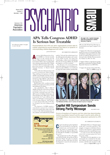As usage of managed behavioral health care has risen in recent years, many may assume that outpatient psychotherapy may be endangered as a psychiatric treatment option.
The situation, however, may not be as grim as it seems, according to a study of mental health care data collected in 1987 and in 1997.
The study, published in the November American Journal of Psychiatry, found no marked change in the overall rate of outpatient psychotherapy use in the United States from 1987 to 1997, even though that decade saw a dramatic expansion in managed behavioral health care. Further, more economically disadvantaged Americans appear to have had access to outpatient psychotherapy in 1997 than in 1987.
The encouraging news comes from Mark Olfson, M.D., an associate professor of clinical psychiatry at Columbia University College of Physicians and Surgeons; Steven Marcus, Ph.D., a research assistant professor in the School of Social Work at the University of Pennsylvania; Benjamin Druss, M.D., an associate professor of psychiatry and public health at Yale University School of Medicine; and Harold Pincus, M.D., executive vice chair of psychiatry at the University of Pittsburgh School of Medicine and director of the RAND-University of Pittsburgh Health Institute.
In 1987 and again in 1997, the Agency for Healthcare Research and Quality conducted surveys to provide national estimates of the use of, expenditures for, and financing of health care services in the United States. Both were conducted with samples of the American civilian, noninstitutionalized population and were designed to provide nationally representative estimates. The first survey, the National Medical Expenditure Survey, was published in 1989; the second survey, the Medical Expenditure Panel Survey, was published in 2000.
Olfson and his colleagues used data from these two surveys to determine how outpatient psychotherapy use in 1997 compared with that in 1987. They found that there was no statistically significant change in the overall rate of outpatient psychotherapy use (3 per 100 persons in 1987 and 4 per 100 in 1997).
They also found a statistically significant increase in the use of outpatient psychotherapy by the unemployed and the poor in 1997 as compared with 1987—specifically, 5 per 100 unemployed persons in 1997 versus 3 in 1987, and 5 per 100 poor persons in 1997 versus 4 in 1987.
Olfson and his colleagues pinpointed another change in outpatient psychotherapy use between 1987 and 1997 that would generally be considered less favorable for psychotherapy: The use of long-term outpatient psychotherapy appears to have declined during this decade. Specifically, 16 percent of survey respondents reporting use of outpatient psychotherapy in 1987 said they received 20 visits or more, compared with only 10 percent of those reporting use of outpatient psychotherapy in 1997—a highly significant statistical difference.
In contrast, the percentage of people getting fewer than 20 visits of outpatient psychotherapy annually seems to have been about the same in 1997 as in 1987. For instance, 37 percent of survey respondents reporting use of outpatient psychotherapy in 1987 said that they received three to 10 visits, compared with 40 percent of survey respondents in 1997—a difference that is not statistically significant.
Moreover, from 1987 to 1997 there was a marked increase in outpatient psychotherapy use provided by physicians. Specifically, only 48 percent of survey respondents getting outpatient psychotherapy in 1987 reported making one or more psychotherapy visits to a physician, compared with 65 percent of survey respondents in 1997.
In contrast, little change appears to have occurred between 1987 and 1997 in the proportion of psychotherapy provided by psychologists. Specifically, 32 percent of survey respondents receiving outpatient psychotherapy in 1987 reported making one or more psychotherapy visits to a psychologist, compared with 35 percent of survey respondents in 1997.
Thirteen percent of survey respondents who said they received outpatient psychotherapy in 1997 reported making one or more psychotherapy visits to a social worker. (However, this figure was somewhat higher than the 7 percent reported in 1987.)
The study was supported by a grant from the Robert Wood Johnson Foundation.
Am J Psychiatry 2002 159 1914
